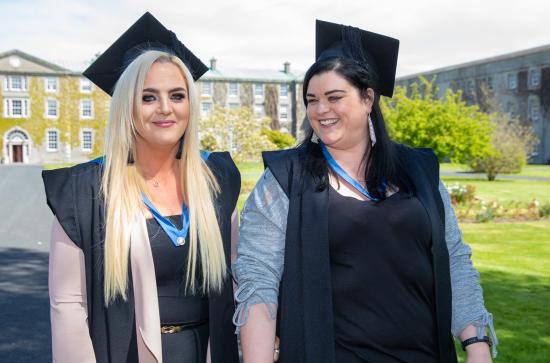
Wednesday, 2 May. Maynooth University today confers 24 men and women from Traveller and Roma communities across Ireland as graduates of its Community Work in a Changing Ireland Level 7 Certificate programme.
The graduates, all of whom are mature students, each completed a minimum of 100 hours of study to achieve their certificates. The course, including modules on community care, social policy and social justice issues, is designed to prepare the students to become leaders and advocates for their communities.
Another key goal for the programme is to empower graduates to act as mediators between their communities and the wider Irish society, allowing for greater communication and understanding of each other’s issues and needs.
The 24 graduates receive a QQI (Quality and Qualifications Ireland) Level 7 Special Purpose Award, which stands alone as a meaningful qualification in community care, and can also act as an access route to further studies and degree courses.
Prof Maurice Devlin, Head of the Maynooth University Department of Applied Social Studies commented: “In a context where fewer than 13% of Travellers complete second level education, and only one percent or less go on to gain third level degrees, this is a significant achievement for the students involved.
“It was also a significant marker of Maynooth University's continued commitment to access to education for Travellers, members of the Roma community and other marginalised groups.”
One of this year’s graduates, Ann Friel said: “Taking part in this programme was of huge benefit to me, and I’m really proud to have achieved my certificate. I hope to use what I have learned throughout this programme to be an advocate and leader in my community, and play my part in breaking down the barriers between Travellers and the rest of Irish society.”
Tracey Reilly, who comes to Maynooth University as a mature student in September of this year to study Community and Youth Work, said: “Without this opportunity I wouldn't have thought I'd get into university, but now I look forward to my degree programme and all it can bring for me, my work and my community.”
A graduate from the Roma community, said: “I am proud to have taken part in this programme. It has given me the skills and confidence to better represent and support my community.”
Community Work in a Changing Ireland is one of a number of programmes developed by the Maynooth University Department of Applied Social Studies to give marginalized communities greater access to third level education.
These are offered on an outreach basis with the support and sponsorship of community-based partner organisations, and cover topics such as community care, youth justice and management and leadership. In this case, Maynooth University worked closely with Pavee Point Traveller and Roma Centre to deliver the course.
Maynooth University President, Professor Philip Nolan congratulated the graduates and their sponsors from Pavee Point, and commended the ongoing commitment of the Department of Applied Social Studies for its innovative approach to outreach, as well as the Access Office for its continued capacity to ensure that its efforts focus on those most excluded.
"Acknowledgement of Traveller ethnicity has rightly created a new confidence and new targets to be achieved. Travellers have a right to third level education and the potential it can unlock and at Maynooth University we are committed and determined to play our part in making this the norm. We are delighted also to welcome Roma students, and look forward to further engagement with this community.”
David Stanton, Minister for State at the Department of Justice and Equality, which also supported the programme, commented: “Education plays a hugely important role in social justice and equality, and having programmes like this to empower members of the Traveller and Roma communities can only serve to make Ireland a fairer and equitable place.”
ENDS
